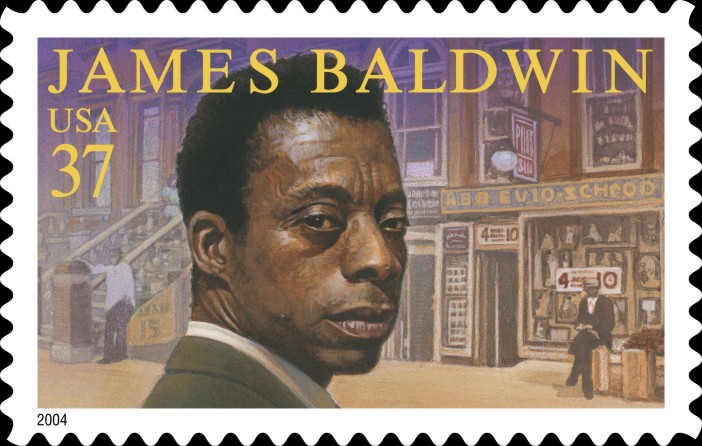Calling God Into Account
Baldwin’s “Go Tell It on the Mountain.”
BY EMILY BURNS MORGAN
[This piece originally appeared in the summer 2015 issue.]
“WHY DON’T PEOPLE read Baldwin anymore?” the Community Bookstore salesman wondered aloud as he searched the computer for Notes of a Native Son, James Baldwin’s 1955 collection of essays about race relations in America and Europe. I told him I didn’t know and nodded like the question baffled me, too. The truth, though, was that my own knowledge of Baldwin’s work was at that time extremely limited. I’d only read one essay from Notes, and was interested in the book mostly as further commentary on Native Son by Richard Wright, and as a potential assignment for my composition classes.
As it turned out, Notes of a Native Son was well written and thought provoking, but I didn’t fall in love and didn’t end up assigning it. Still, the bookstore man’s comment stuck in my head, and so when I found Giovanni’s Room in a free box on a brownstone stoop I picked it up and took it home. The short novel struck me immediately with its beauty and raw honesty. The central conflict here is that David, an American in Paris, falls in love, or at least into an intense relationship, with Giovanni, a young male bartender. Will David stay in Paris and pursue a difficult romance? Or will he return to the United States, his female fiancée, and a “normal” life? David’s fervor in grappling with these questions is melodramatic—but then again, it’s a story about a bisexual teenage boy in love with another boy in Paris in the 1950s. How could it not be dramatic? The sentimentality is part of what makes the book believable and engrossing.
I enjoyed Giovanni’s Room immensely, so when I came across Go Tell It on the Mountain during an afternoon’s initial perusal of one of my new locals, the haphazard Broadway Book Mall in Denver, I had to buy it. And I’m glad I did. Go Tell It on the Mountain revolves around fourteen-year-old John, the son of a Seventh Day Adventist preacher in Harlem. “Everyone had always said that John would be a preacher when he grew up, just like his father. It had been said so often that John, without ever thinking about it, had come to believe it himself.” At first the issue seems fairly straightforward—will John follow in the footsteps of his cold, apparently unloving father? Baldwin quickly complicates matters by taking us back in time to when the adults in John’s life were themselves young.
John’s supposed father, Gabriel, spends his youth drinking and sleeping around before finding religion. Gabriel’s sister, Florence, is a pious young woman who looks after their mother and spends time with her best friend, Deborah. Deborah is infamous in their small town, as she has the unfortunate distinction of having been raped by a group of white men when she was a young girl. After Gabriel gets saved, he marries Deborah, possibly as penance for his sins and insurance against future ones (of course, that doesn’t quite work out). Eventually, Deborah dies. Gabriel moves to New York where Florence is living. She was married, but her husband has left her. Gabriel meets his next wife, Elizabeth, who works cleaning office buildings with Florence, at his sister’s house. Elizabeth has had a baby by her boyfriend, Richard, but Richard has killed himself after being held by the police for a crime he didn’t commit. Gabriel marries Elizabeth, claiming he’ll raise her son as his own. Instead he holds John at arm’s length, cherishing his trouble-making biological son instead.
These backstories are full of sorrow, misfortune, and cruelty, but there is love, intrigue, and beauty, too. Baldwin certainly has a flair for the dramatic. That’s often a good thing, but John’s salvation scene in Go Tell It on the Mountain is not such an instance. This section goes on for fifteen pages, and still I’m not sure what Baldwin is trying to say about religion.
A complicating factor in the question of the author’s attitude towards religion is Giovanni’s Room, as well as the distinct impression I got from Go Tell It on the Mountain that John is gay and has a crush on Elisha, the son of the main preacher at their church. (Gabriel is only a substitute preacher.) One day, Elisha’s father chastises Elisha and his girlfriend in front of the entire congregation, claiming that their smiles and hand-holding are sinful, and will lead to sins of the flesh in short order. As John watches this upbraiding he starts to imagine what happens between Elisha and Ella Mae when no one else is around, “and the fever of which they stood accused began also to rage in him.” Any lust is considered sinful in this church; John’s own inclinations, of course, are even worse:
He had sinned. In spite of the saints, his mother and father, the warnings he had heard from his earliest beginnings, he had sinned with his hands a sin that was hard to forgive. In the school lavatory, alone, thinking of the boys, older, bigger, braver, who made bets with each other as to whose urine could arch higher, he had watched in himself a transformation of which he would never dare to speak.
John has been brought up to believe that his very nature is sinful, that it must be conquered through abnegation and the grace of God. He is a bright, charming boy. He considers things carefully and does not complain when his parents forget his birthday. He could likely become a popular preacher. But how to bring together these two seemingly incompatible facets of himself—his love of God and his attraction to other boys? John, like his aunt and his mother, finds himself “divided between a terrible longing to surrender and a desire to call God into account.”
Like Giovanni’s Room inquired about David, Go Tell It on the Mountain asks what will become of John. Will he retain the feelings of gratitude and joy he uncovers through his spiritual experience at church? Despite his initial doubts about religion, the long scene describing John’s experience suggests that his conversion is genuine:
Then John saw the Lord—for a moment only; and the darkness, for a moment only, was filled with a light he could not bear. Then, in a moment, he was set free; his tears sprang as from a fountain; his heart, like a fountain of waters, burst. Then he cried: ‘Oh, blessed Jesus! Oh, Lord Jesus! Take me through!’ . . . For his drifting soul was anchored in the love of God; in the rock that endured forever. The light and the darkness had kissed each other, and were married now, forever, in the life and the vision of John’s soul.
It’s hard not to read such earnestness as a true moment of unity with the supreme deity, or at least with the oneness of the universe. John seems to experience a real moment of transcendence.
The title of the novel strikes a similarly triumphant tone. “Go Tell It on the Mountain” is, in my opinion, one of the best hymns we ever sang in the church I grew up in, a Lutheran church in small-town Iowa. An African American spiritual dating to 1864, the song’s lyrics exhort the listener to “Go tell it on the mountain that Jesus Christ is born!” We only sang it at Christmas, but when we did it felt like a rare opportunity, in my staid church where people didn’t clap even after the choir sang, to shout one’s love of God to the rooftops. I can’t help but believe that Baldwin intended the title, and John’s salvation scene, to evoke some of that joy. As someone who grew up in the church but, like Baldwin, no longer follows it as an adult, I know it’s possible to reject facets of a religion and still remember the pleasures of it. I still appreciate the beauty of the pageantry and the comfort of the ritual. I still believe in communion with the divine. I would argue that Baldwin does, too.
So, despite some hypocritical practitioners among its characters, the book does seem to cast Christianity in a positive light. Then again, as savvy readers, we understand that John cannot pursue both his sexual preferences and a role in this particular church. We know it is unlikely that he will remain “saved,” if saved means transformed from gay to straight, despite Elisha’s hopefulness:
‘He come through,’ cried Elisha, ‘didn’t he, Deacon Grimes? The Lord done laid him out, and turned him around and wrote his new name down in glory. Bless our God!’ And he kissed John on the forehead, a holy kiss. . . . The sun had come full awake. It was waking the streets, and the houses, and crying at the windows. It fell over Elisha like a golden robe, and struck John’s forehead, where Elisha had kissed him, like a seal ineffaceable forever.
Is the mark left on John really the church’s? Or is it Elisha’s? Will John remain “saved,” the kiss of Elisha chaste, or will he turn away from the church, to a life of “sin”? His last words—“I’m ready. I’m coming. I’m on my way.”—spoken to a typically stern Gabriel, could be read any which way, and that, I think, is the point.
In his essay “Everybody’s Protest Novel” Baldwin points to the reason that books like Native Son and Uncle Tom’s Cabin, important though they may be, are not generally considered great literature. As Virginia Woolf put it in A Room of One’s Own, the problem is that those authors are hampered by grievances, didacticism, points they wish to make, and so take their eye off of their main job—to tell a good story. Baldwin, at least in the novels I’ve read, ably transcends this pitfall. Gay and black and writing in the 1950s, Baldwin had plenty to be angry about. One could hardly blame him for sliding into moralizing. But, in the fiction, he does not. Baldwin’s reader is appropriately unsure as to what the author thinks of his characters. Should John give up love? Religion? Neither? The author won’t say, and as such the mind of the reader is free to think not of right and wrong, politics and policy, but to consider the lives of people, to feel for and with them, to be inspired and saddened and confused alongside them. No matter what, Baldwin treats his characters with compassion, and if there is any argument in this book it is only that: that we should be compassionate, too. I can’t think of a better reason to read anything—especially right now, especially about the black experience in the U.S.—than that.
Emily Burns Morgan is a writer, editor, and professor in Denver, Colorado. Her work has appeared in The Raleigh Review, Killing the Angel, and The Montreal Review, among other publications.









